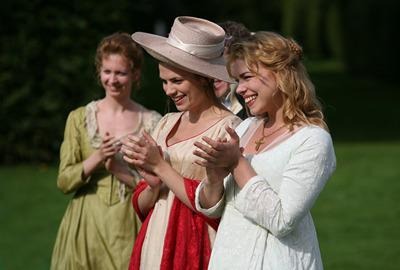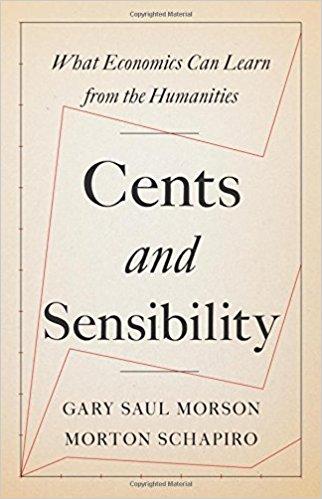Jane Austen News - Issue 92
What's the Jane Austen News this week?
 Jane Austen fans are often fans of other classic authors too. If you like Jane Austen, chances are you also like the works of a Bronte or of Hardy, etc etc. This is a bit of a generalisation, it's true, but all the same we thought that a fair few of our Jane Austen fans might like to know that the BBC is about to air a new four-part, classic costume drama.
The new production is a new adaptation of EM Forster's novel, Howards End, and will star Matthew Macfadyen (who played Mr Darcy in the 2005 film adaptation of Pride and Prejudice), and Hayley Atwell (who played Mary Crawford in the 2007 ITV production of Mansfield Park).
We know that some might say classics stories like this one, and equally the novels of Austen, have been adapted enough and we don't need anymore period dramas, but Mr Macfadyen has made an incredibly salient point about why new adaptations like this one are still popular and worth watching:
Jane Austen fans are often fans of other classic authors too. If you like Jane Austen, chances are you also like the works of a Bronte or of Hardy, etc etc. This is a bit of a generalisation, it's true, but all the same we thought that a fair few of our Jane Austen fans might like to know that the BBC is about to air a new four-part, classic costume drama.
The new production is a new adaptation of EM Forster's novel, Howards End, and will star Matthew Macfadyen (who played Mr Darcy in the 2005 film adaptation of Pride and Prejudice), and Hayley Atwell (who played Mary Crawford in the 2007 ITV production of Mansfield Park).
We know that some might say classics stories like this one, and equally the novels of Austen, have been adapted enough and we don't need anymore period dramas, but Mr Macfadyen has made an incredibly salient point about why new adaptations like this one are still popular and worth watching:
I can see why people sometimes say, “Oh, not another period drama”, but that’s only because some period dramas aren’t done very well, or they’re done in a boring way. This one is eternally relevant. The social mores might have changed, but people’s behaviour hasn’t. It has money and class, the battle of the sexes, society and sex and family. Human behaviour is the same whether you’re wearing a frock coat or a hoodie. These issues endure.Well said! We're certainly looking forward to seeing it when it airs this Sunday (12th November) at 9pm on BBC One, and we're sure that a few other Jane Austen fans like us will be too!

 lovely food she'd been eating, or looking forward to eating, in the letters she wrote to Cassandra.
It's been mentioned a few times recently that she was the first writer to use the term "dinner party" in a book - in this case in Mansfield Park in chapter 41, but we didn't realise, until this week, that she also has the honour of being the person to whom the first recorded use of the term "sponge cake" can be attributed.
In an article for the Telegraph, the QI Elves (the researchers behind the hit UK panel show QI) shared some of their favourite weird facts that they'd found out while researching for the show, but which had sadly not made it onto camera. This fact about Jane being one of them.
lovely food she'd been eating, or looking forward to eating, in the letters she wrote to Cassandra.
It's been mentioned a few times recently that she was the first writer to use the term "dinner party" in a book - in this case in Mansfield Park in chapter 41, but we didn't realise, until this week, that she also has the honour of being the person to whom the first recorded use of the term "sponge cake" can be attributed.
In an article for the Telegraph, the QI Elves (the researchers behind the hit UK panel show QI) shared some of their favourite weird facts that they'd found out while researching for the show, but which had sadly not made it onto camera. This fact about Jane being one of them.
7. The first recorded use of the word “sponge cake” was by Jane Austen. Andrew: It was in a letter to her sister. I’m not sure we have her response, but it was presumably complete bafflement.A couple of the other facts we enjoyed learning about were: that the world's leading fortune-cookie writer has retired after 30 years - because of writer's block, and, a scientist called Neil Gemmell is going to look for the Loch Ness Monster's dandruff. As fun as these are, we'd rather stick with Jane and have sponge cake than fortune cookies or monster dandruff! (She knew where her priorities lay.) If you'd like to bake your own Regency version of pound cake (which is the sponge cake Jane was referring to) you can find our recipe here. If you'd like to read the full QI Elves article, that can be found here.
 This week we came across one of the most curious claims in an Austen-based essay which we've ever found. The premise was that Charles Darwin and Jane Austen are linked together because both explored the nature of the human species.
While we couldn't imagine Jane joining Charles Darwin in his discussions about how pre-human apes evolved into humans, we read on in curiousity. All became clear.
"Darwin emphasizes the struggle for existence that involves all living beings, the survival of the fittest[...] Austen focuses on a different quality crucial to our survival, and to the survival of most mammals and birds: our ability to cooperate."
Ok, so that kind of link makes sense, but why link the two together at all? Well Charles Darwin is the figure who Jane Austen has just replaced on the £10 note, and Wendy Jones, the author of the essay in question (Jane Austen, Mirror Neurons, and Bonobos), argues that replacing Darwin with Austen on the note has a deeper meaning that just honouring Austen:
This week we came across one of the most curious claims in an Austen-based essay which we've ever found. The premise was that Charles Darwin and Jane Austen are linked together because both explored the nature of the human species.
While we couldn't imagine Jane joining Charles Darwin in his discussions about how pre-human apes evolved into humans, we read on in curiousity. All became clear.
"Darwin emphasizes the struggle for existence that involves all living beings, the survival of the fittest[...] Austen focuses on a different quality crucial to our survival, and to the survival of most mammals and birds: our ability to cooperate."
Ok, so that kind of link makes sense, but why link the two together at all? Well Charles Darwin is the figure who Jane Austen has just replaced on the £10 note, and Wendy Jones, the author of the essay in question (Jane Austen, Mirror Neurons, and Bonobos), argues that replacing Darwin with Austen on the note has a deeper meaning that just honouring Austen:
She represents attunement and cooperation over aggression and competition. The replacement is particularly apt since our current strategies for survival aren’t working particularly well. How soon we forget the lessons of history. Extensive wars and assaults on the environment suggest that we are quickly going to hell in a handbag as a species. A kinder, gentler strategy might well purchase our salvation in a literal as well as a moral sense.
Libraries across the country have been holding special Jane Austen events this year to mark the Austen bicentenary. One
 which took place last week which we thought was rather fun was An Austentatious Murder.
On Thursday November 2nd a murder mystery was staged in High Wycombe by the group Highly Suspect. It was the role of participants to play detective and find the killer of the creator of the Dating Mr Darcy app. He is found dead of a broken heart.
It won't have appealed to all Jane Austen fans, but we thought it sounded like a lot of fun. Well done to Eccleston Library for hosting such a unique Austen-themed event!
which took place last week which we thought was rather fun was An Austentatious Murder.
On Thursday November 2nd a murder mystery was staged in High Wycombe by the group Highly Suspect. It was the role of participants to play detective and find the killer of the creator of the Dating Mr Darcy app. He is found dead of a broken heart.
It won't have appealed to all Jane Austen fans, but we thought it sounded like a lot of fun. Well done to Eccleston Library for hosting such a unique Austen-themed event!
A Street Close Named Jane Austen
A new housing development at Prince Philip Barracks in Whitehill in East Hampshire has been trying to come up with  some appropriate names for the new streets it is creating.
In the mix are suggestions such as:
some appropriate names for the new streets it is creating.
In the mix are suggestions such as:
 some appropriate names for the new streets it is creating.
In the mix are suggestions such as:
some appropriate names for the new streets it is creating.
In the mix are suggestions such as:
- Blackburne Close (after Sir Kenneth William Blackburne, the first governor-general of Jamaica, born in Bordon in 1907)
- Tony Rolt Drive (after Major Anthony Peter Roylance “Tony” Rolt, a war hero and British racing driver, born in Bordon in 1918)
- Newton Close (after Edward Newton, the English cricketer who played for Hampshire in 1900)
 Jane Austen News is our weekly compilation of stories about or related to Jane Austen. Here we will feature a variety of items, including craft tutorials, reviews, news stories, articles and photos from around the world. If you’d like to include your story, please contact us with a press release or summary, along with a link. You can also submit unique articles for publication in our Jane Austen Online Magazine.
Don’t miss our latest news – become a Jane Austen Member and receive a digest of stories, articles and news every week. You will also be able to access our online Magazine with over 1000 articles, test your knowledge with our weekly quiz and get offers on our Online Giftshop. Plus new members get an exclusive 10% off voucher to use in the Online Giftshop.
Jane Austen News is our weekly compilation of stories about or related to Jane Austen. Here we will feature a variety of items, including craft tutorials, reviews, news stories, articles and photos from around the world. If you’d like to include your story, please contact us with a press release or summary, along with a link. You can also submit unique articles for publication in our Jane Austen Online Magazine.
Don’t miss our latest news – become a Jane Austen Member and receive a digest of stories, articles and news every week. You will also be able to access our online Magazine with over 1000 articles, test your knowledge with our weekly quiz and get offers on our Online Giftshop. Plus new members get an exclusive 10% off voucher to use in the Online Giftshop.



2 comments
I had always read that Jane Austen was the first to use the term “base ball” in Northanger Abbey but the Oxford English Dictionary has citations going back to 1748, though her use is listed there too.
Anonymous
As well as sponge cake, Jane Austen’s letters also contain the first mention of Bath Buns! (This is according to the Oxford English Dictionary – who ought to know).
Anonymous
Leave a comment
This site is protected by hCaptcha and the hCaptcha Privacy Policy and Terms of Service apply.